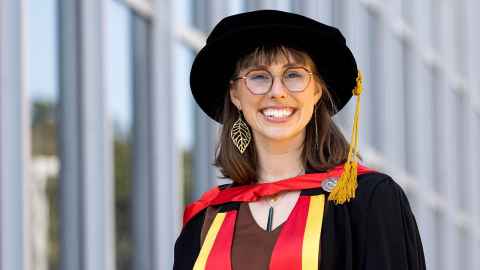Pacific climate justice is psychology graduate’s cause
20 September 2023
Dr Olivia Yates wants fair treatment of the people of the low-lying atoll countries of Tuvalu and Kiribati.

Climate justice for and with the people of low-lying atoll countries like Tuvalu and Kiribati is the focus of Dr Olivia Yates who graduated with a PhD in psychology this week.
Inspired by Naomi Klein’s book This Changes Everything: Capitalism vs. The Climate and the cause of climate justice, Olivia joined youth-led advocacy group Generation Zero in 2018.
Her advocacy informed her PhD research, where she worked with the Tuvaluan and Kiribati communities in Tāmaki Makaurau Auckland, gauging attitudes toward climate change and looking ahead to New Zealand’s likely role as a host of future climate migrants.
“Now, I hope to continue to be able to work alongside the Tuvaluan and Kiribati communities to see the delivery of climate and mobility justice,” says Olivia, 29, a former student at Tauranga Girls’ College.
“Specifically, I would like to see the New Zealand Government fill gaps in climate mobility policy in a way that ensures people can choose to stay in their homelands or to migrate elsewhere – and with dignity, into good jobs, with equitable pay and social protections.”
She’s the lead author of a research report and policy brief released this week, “Preparing for Climate Mobility from Tuvalu and Kiribati to Aotearoa.”
Rising sea levels, salinisation, extreme weather and reduced food and water security make life more difficult on low-lying atoll countries
While most people don’t want to leave their ancestral lands, rising sea levels, saltwater intrusion (salinisation), extreme weather events and reduced food and water security are making life more difficult on the low-lying atoll countries.
Aotearoa has a key role to play in supporting those who wish to move, the report says, advocating a three-pronged approach:
- Making the journey easier by reforming existing visa pathways and creating a new climate mobility-specific visa pathway
- Supporting communities to regrow roots by backing community-led initiatives to ease resettlement burdens, support the maintenance of roots (identity and cultural heritage), and foster community engagement.
- Rewriting the narrative by developing a communications strategy to educate and prepare New Zealanders for climate mobility from the Pacific.
The policy brief will be shared on the Climate Health Aotearoa website and by the Centre for Asia Pacific Refugee Studies at the University of Auckland.
Now a climate policy adviser for World Vision New Zealand, Olivia travels to Senegal next week for Climate Academy 2023, an annual United Nations-led event. The topic is “supporting community choices in a changing climate – learning from planned relocations.”
Olivia’s thesis is entitled “Stories of Neighbours and Navigators: Perceptions and Implications of Climate Mobility from Tuvalu and Kiribati to Aotearoa New Zealand.”
Media contact
Paul Panckhurst | media adviser
M: 022 032 8475
E: paul.panckhurst@auckland.ac.nz